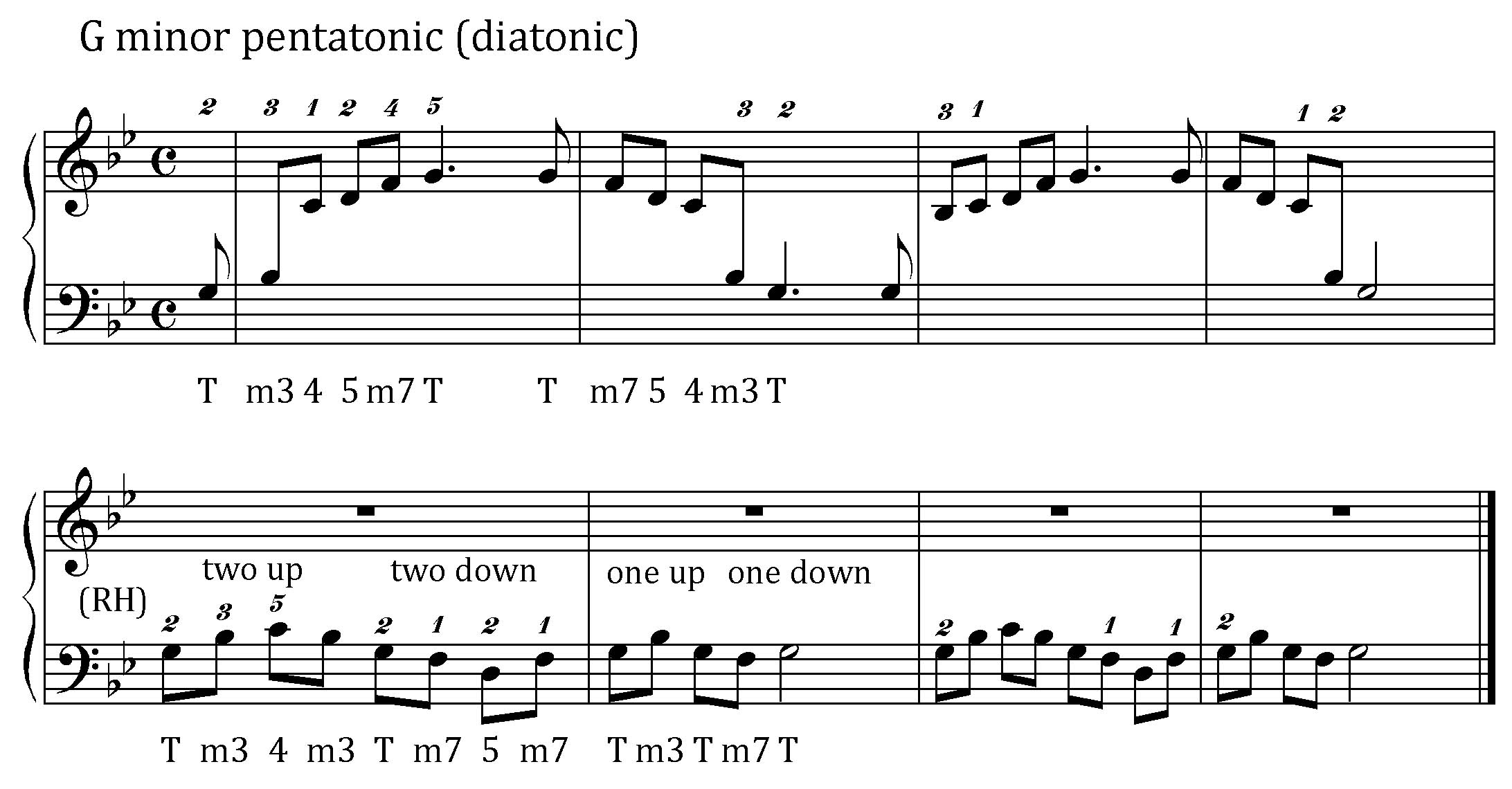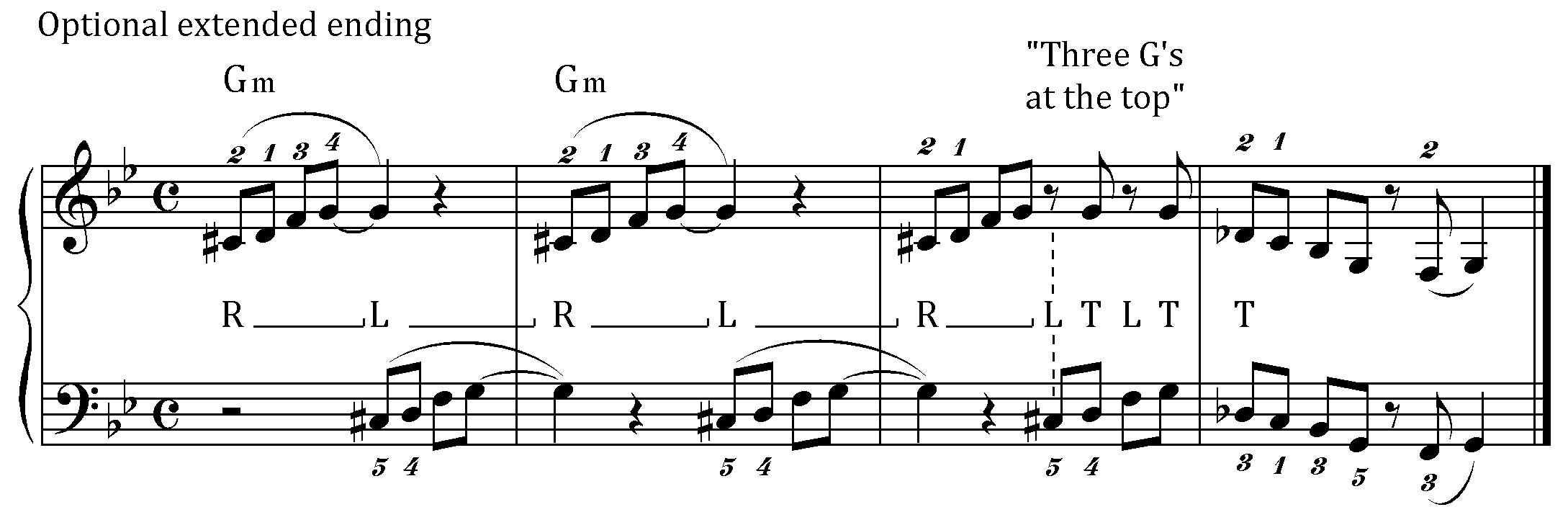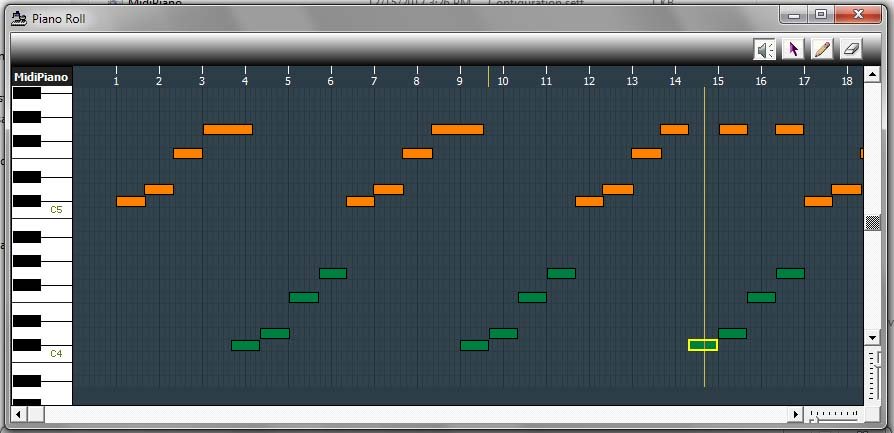THE MUSICARTA PENTATONICS WORKBOOK
(Take it) 'From the Middle'
More minor pentatonic CPT practice
'From the Middle' drills the sharp four/flat five chromatic passing tone (semitone/CPT) up and down the keyboard and introduces your first non-all-white-key pentatonic scales - G and B minor pentatonics.
Here's a performance of the first module riff.
Count and drill the G minor pentatonic scale
First follow the video to count the G minor pentatonic scale.
Here's the G minor keyboards with the one chromatic passing tone we'll be using marked up.

A minor pentatonic scale practice pattern
Here's
a simple scale practice pattern you can (and should!) use to run through the tones
of any minor pentatonic scale. It's 'diatonic' - that is, it uses only the five basic pentatonic scale tones, with no 'chromatic' passing tones, and also rehearses the familiar 'two up, two down' notes.

It's all for the right hand. Listen to/watch the performance and study the scale tone mark-up until you understand it, then you can use it (re)familiarise yourself with any minor pentatonic scale.
It goes up and down the minor pentatonic scale twice, then rehearses the familiar 'two up, two down' notes.
Try to memorise the tune so can visualise it playing in various keys in your mind's eye from time to time.
There's a more advanced, two-handed version in the scale practice patterns module.
The riff pattern in G minor
Learn the
up-and-down 'from the middle' (= the chromatic #4/H5 passing tone)
riff pattern in G minor
The main difficulty will probably fitting the left hand into the right hand syncopated pattern. Deal with it intelligently!

The riff pattern in A minor
Practice the pattern in A minor. You've already played the A minor plus-one-CPT scale in Gliding About – the only difference is you're now playing it 'from the middle'.
The video includes the minor pentatonic scale practice pattern you played in G minor.
Assemble your performance
You can probably move straight to trying a performance now.
The chord sequence is really basic. Each chord symbol stands for one bar – a count "1, 2, 3, 4"

It's eight bars of G minor (half the chorus), one quarter of A minor (four bars) and back for one quarter of G minor. You can make something simple like that work if you play with conviction!
Copy this next performance - a rough approximation will do for now.
Here's the fingering for the 'unison' ending, where the left hand joins with the tune.
This video shows how you join up the left hand bass figures.
The extended ending
Extended endings are easy to put together, and add sophistication to your compositions or improvisations.
When you come across something potentially baffling like this – simplify!
- Drop
the rhythm (the 'triplet feel') and just play 'straight quavers'. You don't even have to play in time.
- Slow it right down. We're only interested in establishing 'what goes with what' – whether the hands play together (T), or just the left hand plays (L) or just the right hand (R) ('TLR analysis').
Here's the 'Together, left, right (TLR) analysis' of this section.

This is 'what we want to know'. If you are trying to learn to play by ear, this is what you should be trying to hear when you listen to your target music.
You see that
just the right hand plays, then just the left, then repeat, then the right hand,
with the left hand coming in after the first of the "3 G's at the
top" (first 'T' above, marked up below).

Play along with the repeating section of this video to drill the tricky R-L-T-L-T-T section.
First module performance
You should now be able to play a recognisable first module performance.
Make sure you can play a passable version - in terms of 'knowing where you're going' - before you go on to Part Two of the module.
|
OUT NOW! |
THE MUSICARTA BEAT & RHYTHM WORKBOOK At last! An effective approach to keyboard rhythm & syncopation skills. Learn more! |
ONLY $24.95! |
|
THE MUSICARTA PENTATONICS WORKBOOK video course
Introductory
Practice Patterns
Melody Work and
Playing by Ear
Pentatonic Riffs
and Diaries - Minor Pentatonic Major Pentatonic
Chromatic Minor
Chromatic Major
Pre-video Pages
Pentatonics videos
Archive Pages
|
YouTube playlists





 THE LOGO
THE LOGO
